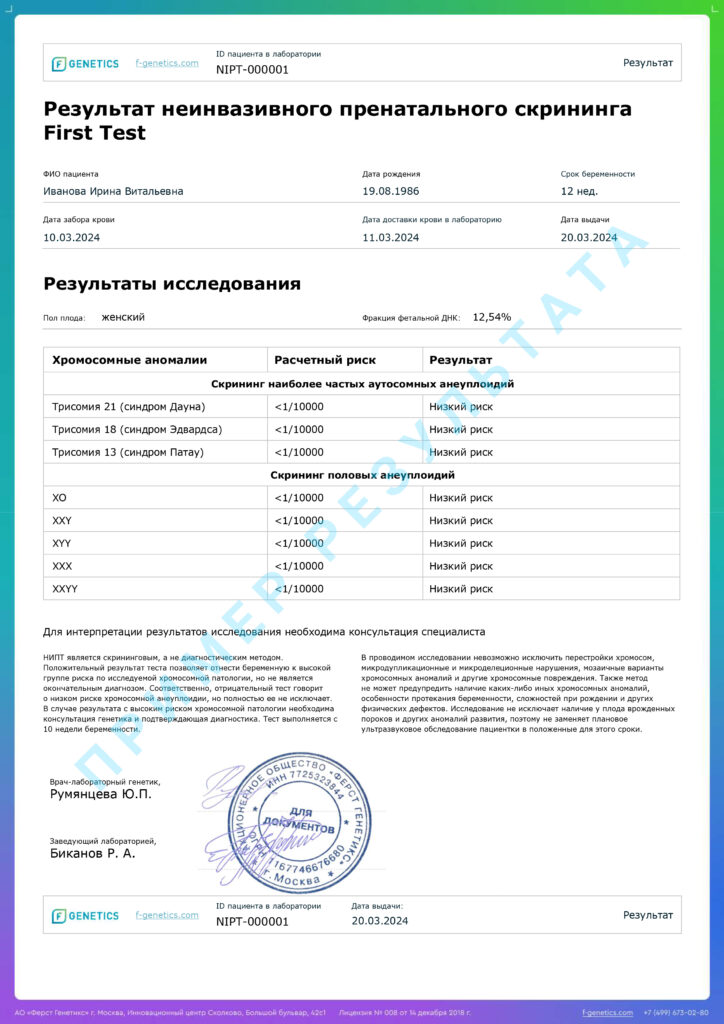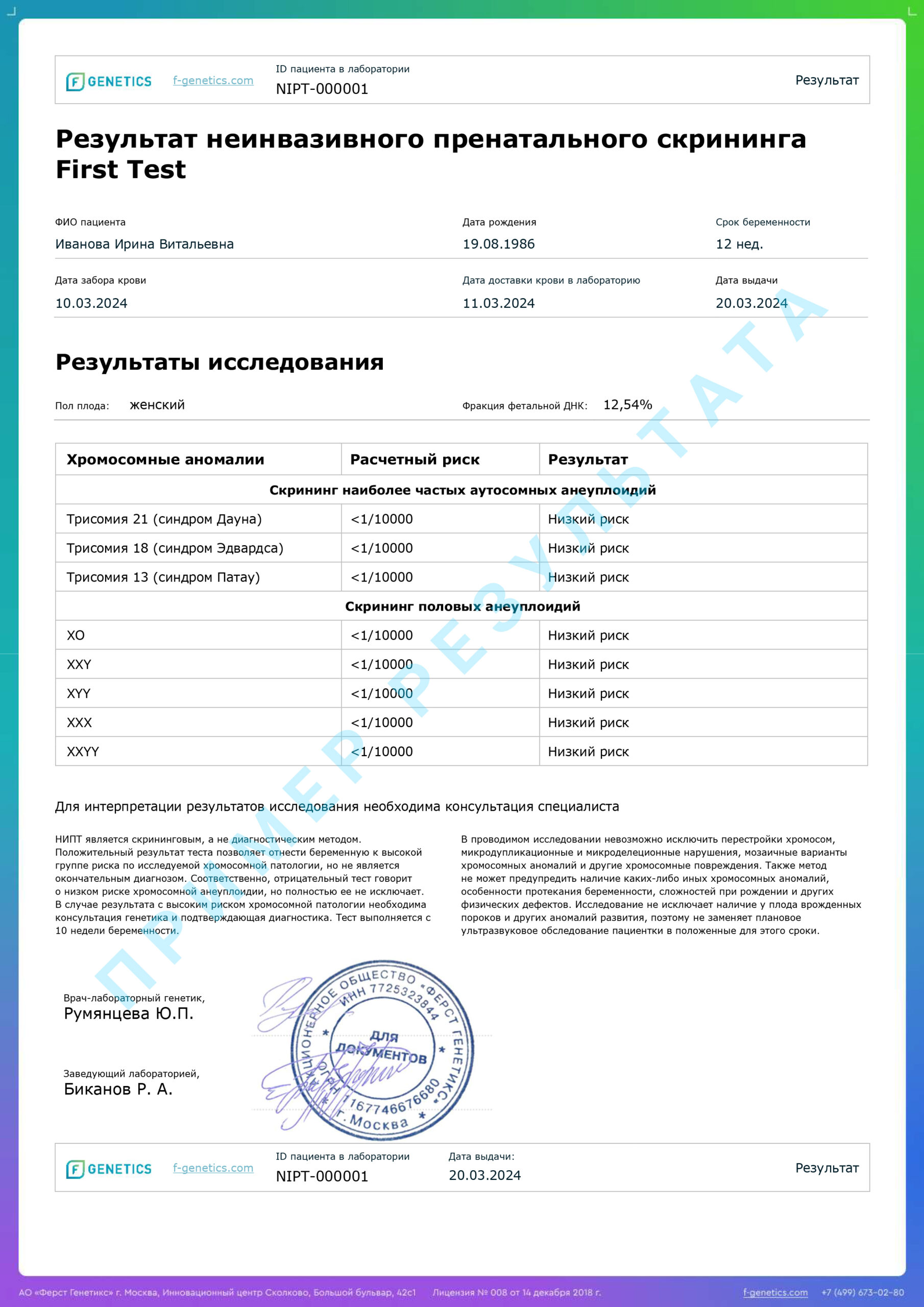 Available on credit
Available on credit
Non–invasive Prenatal Screening
This is a modern method of prenatal testing based on fetal DNA analysis from the venous blood of the mother to calculate the risk of developing chromosomal diseases in the fetus, such as: trisomy, abnormalities in the sex chromosomes.
Timeframe
NIPT accuracy
across Russia
All NIPT tests: free genetic counselling in the case of a high-risk result
- Down syndrome
- Edwards syndrome
- Patau syndrome
- Turner syndrome
- Trisomy-X
- Klinefelter syndrome
- Jacobs syndrome (disomy - Y)
- XXYY syndrome
- Gender determination (optional)
- Free invasive diagnostics in the case of a high-risk result
- In case of a double pregnancy
- Down syndrome
- Edwards syndrome
- Patau syndrome
- Turner syndrome
- Trisomy-X
- Klinefelter syndrome
- Jacobs syndrome (disomy - Y)
- XXYY syndrome
- Gender determination (optional)
- Free invasive diagnostics in the case of a high-risk result
- In case of a double pregnancy
- Down syndrome
- Edwards syndrome
- Patau syndrome
- Turner syndrome
- Trisomy-X
- Klinefelter syndrome
- Jacobs syndrome (disomy - Y)
- XXYY syndrome
- Gender determination (optional)
- Free invasive diagnostics in the case of a high-risk result
- In case of a double pregnancy
- Down syndrome
- Edwards syndrome
- Patau syndrome
- Turner syndrome
- Trisomy-X
- Klinefelter syndrome
- Jacobs syndrome (disomy - Y)
- XXYY syndrome
- Gender determination (optional)
- Free invasive diagnostics in the case of a high-risk result
- In case of a double pregnancy
Calculator of the risk of chromosomal abnormalities depending on the age of the expectant mother
Non–invasive Prenatal Screening (NIPT)
The non-invasive prenatal test (NIPT) is a genetic screening method to determine the risk of having a baby with certain chromosomal abnormalities.
During pregnancy, fetal DNA circulates in a woman’s blood. Using maternal blood, starting from the 10th week of pregnancy, with the help of NIPT, fetal DNA can be extracted and analyzed for the presence of common chromosomal diseases, such as Down syndrome, Patau, Edwards and sex chromosome pathologies.
In all antenatal clinics, pregnant women undergo a combined biochemical screening at 10-13 weeks, which includes ultrasound and a biochemical blood test. But unlike NIPT, this study is not accurate enough, as the risk calculation is based on biochemical markers, ultrasound data, and maternal age. NIPT directly evaluates fetal DNA and is therefore highly accurate.
NIPT does not require intervention in the body, which makes the non-invasive test a safe, very convenient and simple method. Another advantage of the non-invasive test is its high sensitivity (about 99% for 21, 13, 18 pairs of chromosomes).
NIPT is performed from the 10th week of pregnancy and does not require special preparation for the delivery of biomaterial.
Non–invasive prenatal screening is recommended for:
- All pregnant women who want to get additional information about the health of the unborn baby
- Pregnant women over the age of 35
- Pregnant women whose screening of the 1st or 2nd trimester showed an increased risk of chromosomal pathology
- Pregnant women who have contraindications to invasive diagnostics (threat of pregnancy loss, fever, infections, tendency to bleeding)
- Pregnant women, if during previous pregnancies the fetus was diagnosed with Down syndrome, Edwards, Patau or other chromosomal pathologies
- Pregnant women who have had cases of intrauterine fetal death, pregnancy loss
Non-invasive prenatal screening usually examines those chromosomes that can cause pregnancies to progress beyond 16 to 18 weeks and result in a severely malformed baby.
These include:
- trisomy 21 (Down syndrome),
- trisomy 18 (Edwards syndrome),
- trisomy 13 (Patau syndrome).
The accuracy of NIPT is quite high, but differs in the analyzed chromosomes.
In addition to screening for the most common syndromes: Down, Edwards, Patau, NIPT also analyzes the X and Y chromosomes, allowing to determine the fetal pathologies associated with their malfunctions:
- XO — X — Turner monosomy syndrome,
- XXX — triple X syndrome,
- XXY — Klinefelter syndrome,
- XYY — Jacobs syndrome,
- XXYY syndrome.
The non—invasive prenatal screening makes it possible to calculate the risks for the most common chromosomal pathologies.
Results of the non—invasive prenatal screening
The prenatal screening report contains a clear, easily interpreted result about the presence of a high or low risk of chromosomal pathology.
Low risk
Absence of chromosomal pathology with an accuracy of more than 99%.
High risk
There is an increased risk of a chromosomal abnormality. All high—risk results should be further investigated by invasive methods (chorion biopsy, amniocentesis).
No result
If the placental DNA level in the sample is below 3.5%, then a second sampling may be required, since a low fraction of fetal DNA is potentially capable of causing a false negative result.
The testing is not carried out in the following cases:
- less than 10 weeks gestation of pregnancy at the time of blood sampling for testing;
- oncological diseases;
- organ or bone marrow transplantation, stem cell therapy;
- allogeneic blood transfusion within the previous year;
- therapy with human serum albumin and/or exogenous DNA cells within the last four weeks;
- heparin therapy within 24 hours before sampling;
- the death of one of the fetuses during multiple pregnancy (earlier than 8 weeks after the discovery of a dead fetus);
- pregnancy with more than two fetuses;
- pregnancy with two fetuses using donor programs (donor eggs, surrogate motherhood).
How to get NIPT?
THE FASTEST WAY: GIVE BLOOD IN THE LABORATORIES OF OUR PARTNERS
Select a laboratory that is convenient for you on the map during the order process.
A CONVENIENT WAY: CALL A COURIER
Call a courier who will bring you a blood collection kit.
Give some blood into the tube that you received in the kit at any site where blood is taken at your location (laboratories, clinics, medical offices).
Blood sampling should be carried out in strict accordance with the instructions attached in the kit.
Be sure to indicate your full name and the date of blood sampling on the tube.
Store the tube in strict accordance with the instructions attached in the kit, before the courier arrives.
Call the number again and give the courier the kit and the tube with blood. The courier will take the tube to the laboratory.
Non-invasive prenatal screening at First Genetics laboratory
Specialists
Years of experience in genetics, laboratory diagnostics and bioinformatics
Confidentiality
All data is strictly confidential and cannot be passed on to third parties
Consulting
You can get an online consultation regarding the results of test
Security
Extensive control at each stage of testing
Free delivery
Free delivery of biomaterial across Russia
Charities
Email info@f-genetics.com for information
NIPT
A safe and accurate test makes sure that there are no chromosomal abnormalities in the baby and determines its gender already in the early stages of pregnancy
8 (800) 201 83 46

All NIPT tests: free genetic counselling in the case of a high-risk result
- Down syndrome
- Edwards syndrome
- Patau syndrome
- Turner syndrome
- Trisomy-X
- Klinefelter syndrome
- Jacobs syndrome (disomy - Y)
- XXYY syndrome
- Gender determination (optional)
- Free invasive diagnostics in the case of a high-risk result
- In case of a double pregnancy
- Down syndrome
- Edwards syndrome
- Patau syndrome
- Turner syndrome
- Trisomy-X
- Klinefelter syndrome
- Jacobs syndrome (disomy - Y)
- XXYY syndrome
- Gender determination (optional)
- Free invasive diagnostics in the case of a high-risk result
- In case of a double pregnancy
- Down syndrome
- Edwards syndrome
- Patau syndrome
- Turner syndrome
- Trisomy-X
- Klinefelter syndrome
- Jacobs syndrome (disomy - Y)
- XXYY syndrome
- Gender determination (optional)
- Free invasive diagnostics in the case of a high-risk result
- In case of a double pregnancy
- Down syndrome
- Edwards syndrome
- Patau syndrome
- Turner syndrome
- Trisomy-X
- Klinefelter syndrome
- Jacobs syndrome (disomy - Y)
- XXYY syndrome
- Gender determination (optional)
- Free invasive diagnostics in the case of a high-risk result
- In case of a double pregnancy


